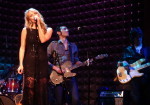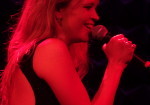![DSC00056-e1401246044227-225x300[1]](https://newyorkevents.co/wp-content/uploads/2014/05/DSC00056-e1401246044227-225x3001.jpg)
Alexia Bomtempo grew up surrounded by music. Her mother, an American singer/songwriter, exposed her to blues, jazz, and folk. Alexia’s father, a Brazilian entertainment producer, initiated her into the world of Brazilian greats like Caetano Veloso, Gal Costa, Gilberto Gil, and Chico Buarque.
At the age of 17, she realized that she wanted to have a career in music. At 21, she was invited by producer Sergio Carvalho to record a demo CD. Her first solo album. Astrolabio came out in 2008. Her most recent album, I Just Happen to Be Here, is a collection of Caetano Veloso covers.
Alejandro Armenta: When you were younger, was there a moment or a song that you heard and made you realize that you wanted to be a singer?
Alexia Bomtempo: I always knew that I was going to be an artist, but I started in theater. When I was 17 I decided to join my high school chorus group and realized that I had a special gift that had to be shared. I gave up on theater right away and embraced music with all my heart.
AA: Nuvem D’Agua stands out on your first album, Astrolábio. It sounds the most personal and heartfelt. Did you write it (forgive me but I could not find any information as to whether this was an original composition or a cover)?
AB: I co-wrote Nuvem D’água and it is indeed a very personal song about being completely in love and pouring your heart out to someone, like rain drops falling from the sky.
-
- Alexia Bomtempo
- Alexia Bomtempo
- Alexia Bomtempo
AA: You included a few covers on Astrolábio, and the one I felt was the most jarring because of its placement in the middle of the album was The Police’s Roxanne. Was this song your choice or your producer’s?
AB: It was both my choice and the producer’s, one of the most amazing musicians in Brazil, Dadi. I was once talking with Roberto Menescal and he was about to engage in a special project with Andy Summers, with bossa versions of The Police songs. He mentioned that Roxanne had been actually written as a bossa nova tune. I kept that in mind and my guitarist at the time (Felipe Pinaud) and I started playing around with the song. We loved what we were doing so much to the point where everyone agreed it should be part of the album. Astrolábio is a very personal, young hearted record. I was 21 when Dadi and I started recording the demos that would then become the album. It reflects the moment that I was going through in life and also my personal discoveries and learning experiences as a young vocalist.
AA: The other covers included works by Caetano Veloso. Your second album, I Just Happen to Be Here, is a collection of covers of Veloso’s English language works that he wrote while in exile. Is the album’s title a reference to you seeing yourself as a conduit of the music rather than the originator?
AB: The title of the album is part of a verse from Veloso’s most well known English song, “London, London” and it refers to my life, about having to be in between two countries and two cultures, moving back and forth and always feeling somewhat “out of place”. However, the meaning of “leaving your country” is totally different in my experience, compared to Caetano’s: I have never been arrested, confined or exiled. I was born two generations after him, of an American mother and Brazilian father, dividing my time between Brazil and the USA. Making this record was very much like engaging in a process of self-discovery. There have been so many comings and goings throughout this American-Brazilian story of mine. Caetano’s music signaled my future, without my even knowing it. Now, I am here. And this didn’t happen by chance – here means who I really am. I just happen to be here and it’s OK. On the map, in life and in music.


